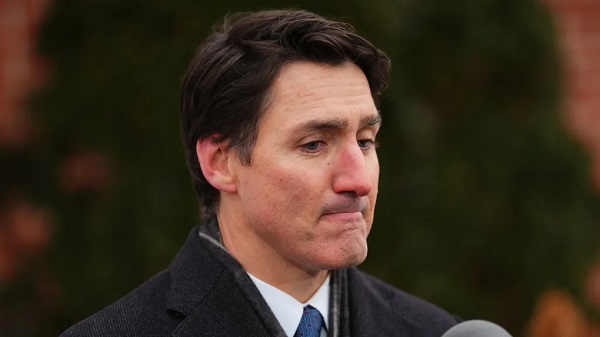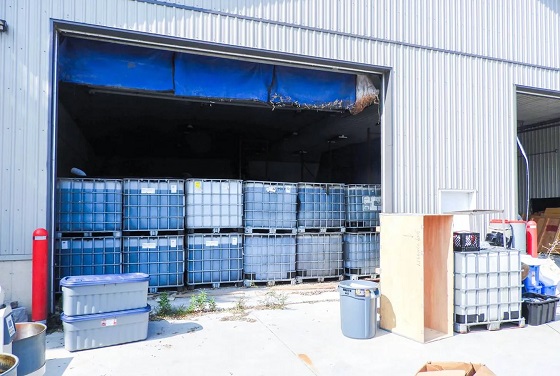National
Canadians challenge Prime Minister’s decision to prorogue Parliament: “no reasonable justification”

 From the JCCF
From the JCCF
The Justice Centre for Constitutional Freedoms is providing lawyers on an urgent basis to two Canadians, David MacKinnon and Aris Lavranos, seeking a Federal Court declaration that Prime Minister Trudeau’s recent prorogation of Parliament is unreasonable and must be set aside.
When Parliament is prorogued, the parliamentary session is terminated, and all parliamentary activity, including work on bills and in committees, immediately stops.
Among its many grounds arguing that Trudeau’s decision to advise the Governor General to exercise her prerogative power to prorogue Parliament to March 24, 2025, this application argues that the decision to prorogue Parliament was “incorrect, unreasonable or both.” The court application, filed today, contends that the Prime Minister’s decision to prorogue “was not made in furtherance of Parliamentary business or the business of government, but in service of the interests of the LPC [Liberal Party of Canada].”
At his news conference yesterday, on January 6, 2025, the Prime Minister’s stated justification for the prorogation was (1) to “reset” Parliament and (2) to permit the Liberal Party of Canada time to select a new party leader. No explanation was provided as to why Parliament could not recess instead. No explanation was provided as to why Members of Parliaments could not immediately exercise their right to vote on a motion of non-confidence in the government. A majority of MPs have now repeatedly promised to do just that, which would trigger an election and provide the needed “reset” in a democratic and legitimate way.
No explanation was provided as to why a prorogation of almost three months is needed. No explanation was provided as to why the Liberal Party of Canada ought to be entitled to such a lengthy prorogation simply so it can hold an internal leadership race.
This Federal Court application includes language taken from a decision of the Supreme Court of the United Kingdom, which ruled in 2019 that then-Prime Minister Boris Johnson had prorogued Parliament unlawfully, as a means of avoiding Parliamentary scrutiny over the government’s “Brexit” negotiations concerning the departure of the United Kingdom from the European Union.
The application contends, among other things, that “in all of the circumstances surrounding it, the [prorogation] has the effect of frustrating or preventing, without reasonable justification, the ability of Parliament to carry out its constitutional functions as a legislature and as the body responsible for the supervision of the executive, particularly insofar as it relates to Parliament’s ability to deal quickly and decisively with especially pressing issues, such as the situation caused by President-Elect Trump’s stated intention to impose a 25% tariff on all goods entering the United States from Canada.”
“This prorogation stymies the publicly stated intent of a majority of MPs to bring a motion for non-confidence in the government and trigger an election. Prorogation serves the interests of the Liberal Party, but it does not further Parliamentary business or the business of government. It violates the constitutional principles of Parliamentary sovereignty and Parliamentary accountability,” stated lawyer James Manson. “We will invite the Court to conclude that the Prime Minister’s decision to advise the Governor General to prorogue Parliament was without reasonable justification.”
Applicant David MacKinnon feels strongly about this case. He stated, “This case concerns a living tree – our Constitution – and how that living tree withers without proper care. If we are to fight tyranny – for it is tyranny that confronts us – we must find the answer within the memory of our historical past. We call this memory ‘the common law.’ It is enshrined in the preamble of our constitution. The common law is the repository and guarantor of our justice and our wealth and happiness. Had we nurtured our living tree, and looked to our past, we would have read Lord Denning’s admonishment to the Attorney General of an earlier time: ‘Be ye never so high, the law is above you.’”
Crime
RCMP Bust Industrial-Scale Superlab Outside Toronto

A months-long RCMP investigation has led to the takedown of a massive synthetic-drug operation resembling the “super labs” often found in British Columbia — but this one was discovered just forty-five minutes north of Toronto. Officers uncovered an industrial-scale facility capable of producing millions of dollars’ worth of fentanyl, methamphetamine, MDMA, and GHB.
The RCMP’s Ontario Federal Policing unit announced Friday that search warrants executed on September 7 in Schomberg, northwest of Toronto, resulted in the seizure of nearly $10 million in suspected controlled substances, along with prohibited weapons, chemical precursors, and a range of illegal production equipment.
In addition to cash, drugs, and chemicals, officers discovered a pill press, firearms, handwritten drug “recipes,” flasks, chemical glassware, and other lab components. Approximately 20,000 litres of hazardous waste were also removed from the site.
Investigators say the probe began in spring 2025, when officers detected a suspicious bulk-chemical order placed by Christopher O’Quinn, operating under the business name O’Quinn Industries. “The chemicals ordered are known to police to be used in the production of fentanyl, MDMA, methamphetamine, and for cannabis extraction,” the RCMP said.
After weeks of surveillance, RCMP officers uncovered what they describe as a large-scale clandestine lab hidden on a Schomberg property. Dismantling the facility required coordination with the Ontario Fire Marshal, Health Canada, and municipal emergency services — a hazardous-materials operation that lasted ten days.
Three suspects — O’Quinn, Liang Xiong Guo, and Katie King — were arrested and face a combined 33 criminal charges.
O’Quinn faces 20 offences, including production and trafficking of Schedule I substances, possession of precursor chemicals, and multiple weapons violations involving a bullpup-style shotgun and a .22-calibre rifle.
Guo faces nine counts linked to the production and trafficking of methamphetamine and MDMA.
King faces four counts related to meth trafficking and illegal firearm possession.
RCMP officials said additional substances are undergoing Health Canada testing to determine whether synthetic opioids such as fentanyl were present.
Authorities also seized $8,000 in cash, multiple firearms, laboratory glassware, and chemicals capable of producing further drug batches valued in the millions.
“The complexity and danger of the operation required extensive inter-agency collaboration,” the RCMP said, thanking partners including the Ontario Provincial Police, Niagara Regional Police, York Regional Police, South Simcoe Police, the Ontario Fire Marshal, Health Canada, the Ministry of the Environment, and the Canada Border Services Agency.
Health Canada testing and court proceedings are ongoing.
Digital ID
Toronto airport requests approval of ‘digital IDs’ for domestic airport travel

From LifeSiteNews
A few months ago, the Canadian government hired outside consultants who will be tasked with looking into whether or not officials should proceed with creating a digital ID system for all citizens and residents.
Canadian airport officials asked the federal government to implement a digital ID for domestic travelers as an option in the name of “modernization.”
Currently, domestic travelers are only required to use physical identification for air travel, including a driver’s license, passport, or government-issued ID card.
However, Toronto’s Pearson International Airport recently recommended that Canada’s Secure Air Travel Regulations be amended to allow for “digital ID to be recognized.”
“To modernize and support enhanced passenger experience, we ask that the government endorse system-wide border and screening modernization including immediate regulatory changes,” Pearson representatives told Canada’s House of Commons finance committee in a recent submission.
Airport managers wrote that “Canada should proactively embrace both emerging and proven technologies that have the potential to enhance the passenger experience and improve operational efficiency and promote productivity across the sector.”
“Key initiatives should include accelerating the adoption of a common digital ID for both domestic and international travel.”
The Canadian Airports Council also told Parliament that a national digital ID program should start with airport travelers, including the introduction of “biometrics.”
The Council asked to “enable digital ID and biometrics in air travel” to allow it to “enable more efficient use of space, reduce pressure on infrastructure and enhance security.”
“At present, Canada is behind our international peers in ensuring travel process security screening, Customs and border procedures and boarding are modern, efficient, simple and biometrically based,” it wrote.
Only non-Canadians are currently mandated to undergo biometric screening as well as fingerprint scans when they enter Canada.
To date, Parliamentary committees have shot down requests for a domestic national identification system.
Some nations, such as the United Kingdom, have recently said they will mandate digital ID using the pretext of illegal immigration as the catalyst.
As reported by LifeSiteNews a few months ago, the Canadian government hired outside consultants who will be tasked with looking into whether or not officials should proceed with creating a digital ID system for all citizens and residents.
Canada’s Privy Council research from 2023 noted that there is strong public resistance to the use of digital IDs to access government services.
Prime Minister Mark Carney has a history of backing central bank digital currencies and supported in 2023 “choking off the money” donated to the Freedom Convoy protests against COVID mandates.
As late as February, the Liberal government under former Prime Minister Justin Trudeau’s immigration ministry, as reported by LifeSiteNews, was secretly asking Canadians via surveys if they would accept a national identification program that would likely end up requiring each citizen to always have a type of “digital” passport on them.
While the Liberal government under Trudeau insisted the program would be optional, Conservative leader Pierre Poilievre nonetheless sounded the alarm by promising to introduce a bill that would “expressly prohibit” digital IDs in Canada.
Digital IDs and similar systems have long been pushed by globalist groups like the World Economic Forum, an organization with which Carney has extensive ties, under the guise of ease of access and security.
Critics, however, have warned that the purpose of such a system is actually to centralize control over citizens. This opinion seems to be mirrored by the general public, with a Bank of Canada survey finding that Canadians are very wary of a government-backed digital currency, concluding that a “significant number” of citizens would resist the implementation of such a system.
-

 MAiD15 hours ago
MAiD15 hours agoDisabled Canadians increasingly under pressure to opt for euthanasia during routine doctor visits
-

 Alberta17 hours ago
Alberta17 hours agoPetition threatens independent school funding in Alberta
-

 Alberta2 days ago
Alberta2 days agoBusting five myths about the Alberta oil sands
-

 Courageous Discourse1 day ago
Courageous Discourse1 day agoNo Exit Wound – EITHER there was a very public “miracle” OR Charlie Kirk’s murder is not as it appears
-

 Business2 days ago
Business2 days agoQuebecers want feds to focus on illegal gun smuggling not gun confiscation
-

 Business16 hours ago
Business16 hours agoCanada Revenue Agency found a way to hit “Worse Than Rock Bottom”
-

 Energy2 days ago
Energy2 days agoMinus Forty and the Myth of Easy Energy
-

 Health2 days ago
Health2 days agoNew report warns WHO health rules erode Canada’s democracy and Charter rights




